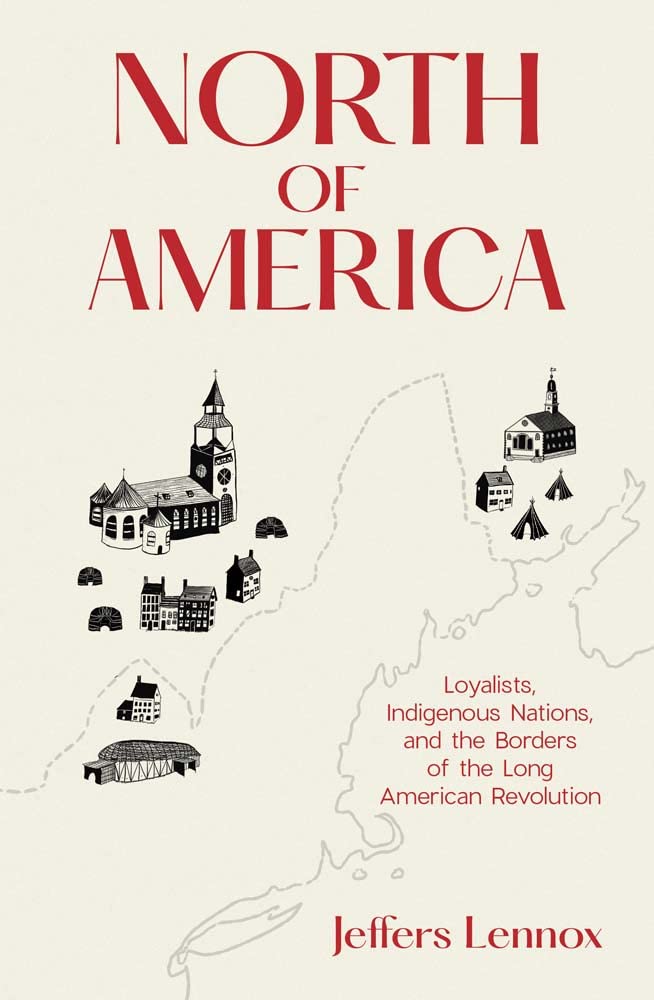North of America explores how the loyal colonies that eventually became canada influenced the process of the american revolution and the creation of the united states. by taking a continental approach to the revolutionary era, from 1774-1815, north of america argues that those who participated in the american revolution -- leading politicans, regular citizens, indigenous nations, free and enslaved blacks -- kept a watchful eye on the provinces to the north. subjects of great britain helped early americans define who they were by forcing them to understand what they weren’t. (yale university press, 2022)
“Elegantly constructed, persuasively argued, and engagingly written, North of America will be recognized as an important and original contribution to American Revolutionary history.”—Peter S. Onuf, coauthor of “Most Blessed of the Patriarchs”: Thomas Jefferson and the Empire of the Imagination
“Studded with surprises, this important book shows how Canada shaped the early United States—sometimes as a friend, more often as a foe or foil. Lennox is an expert storyteller.”—Caitlin Fitz, author of Our Sister Republics
“Jeffers Lennox makes a significant contribution to the general understanding of how the thirteen colonies achieved independence and national definition.”—Richard D. Brown, author of Self-Evident Truths
“North of America is much needed integration of the role and relationship of Canada to the United States in both the American Revolution and the period of the Early Republic. The book represents an important contribution to both the continental and imperial perspective of early American history.”—Andrew O’Shaughnessy, author of The Men Who Lost America
“Elegantly constructed, persuasively argued, and engagingly written, North of America will be recognized as an important and original contribution to American Revolutionary history.”—Peter S. Onuf, coauthor of “Most Blessed of the Patriarchs”: Thomas Jefferson and the Empire of the Imagination
“Studded with surprises, this important book shows how Canada shaped the early United States—sometimes as a friend, more often as a foe or foil. Lennox is an expert storyteller.”—Caitlin Fitz, author of Our Sister Republics
“Jeffers Lennox makes a significant contribution to the general understanding of how the thirteen colonies achieved independence and national definition.”—Richard D. Brown, author of Self-Evident Truths
“North of America is much needed integration of the role and relationship of Canada to the United States in both the American Revolution and the period of the Early Republic. The book represents an important contribution to both the continental and imperial perspective of early American history.”—Andrew O’Shaughnessy, author of The Men Who Lost America
"Homelands and Empires is an excellent study of the struggle among Indigenous nations, the French, and the British for territorial sovereignty in Northeastern North America, what is now Nova Scotia, New Brunswick, PEI, and parts of Maine and Quebec. It is the best study available to lay out the complex negotiations over the region and how importantly they figured in diplomatic negotiations in the eighteenth century." -- Elizabeth Mancke, Department of History, University of New Brunswick
︎︎︎︎︎︎︎︎︎︎︎︎︎︎︎︎︎︎
"A Time and a Place: The Geography of British, French, and Aboriginal Interactions in Early Nova Scotia, 1727-1744" William and Mary Quarterly, 3rd ser. 72, 3 (July 2015): 423-60. (PDF CLICK HERE)
"A Time and a Place: The Geography of British, French, and Aboriginal Interactions in Early Nova Scotia, 1727-1744" William and Mary Quarterly, 3rd ser. 72, 3 (July 2015): 423-60. (PDF CLICK HERE)
︎︎︎︎︎︎︎︎︎︎︎︎︎︎︎︎︎︎
“Nova Scotia Lost and Found: The Acadian Boundary Negotiation and Imperial Envisioning, 1750-1755” Acadiensis (Summer/Autumn 2011): 3-31. (PDF CLICK HERE)
“Nova Scotia Lost and Found: The Acadian Boundary Negotiation and Imperial Envisioning, 1750-1755” Acadiensis (Summer/Autumn 2011): 3-31. (PDF CLICK HERE)


